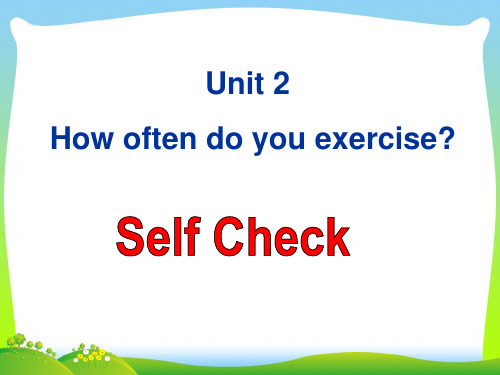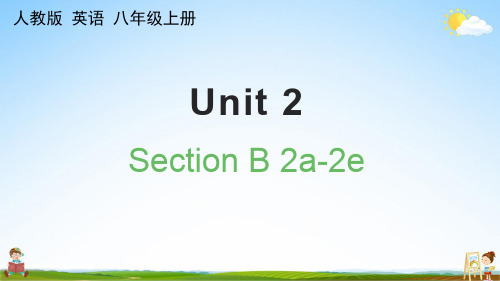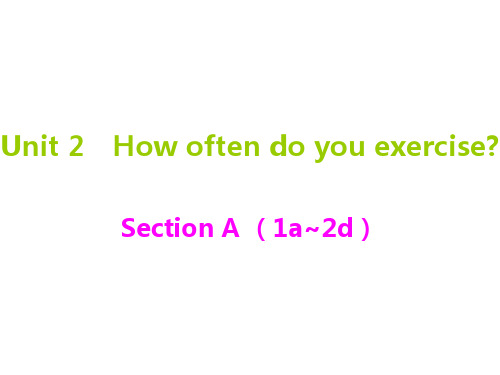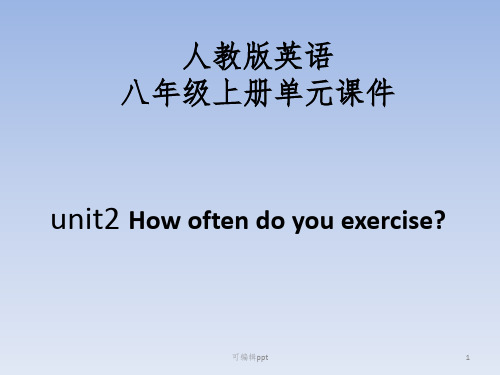人教版八年级英语上册Unit2课件
人教版八年级英语上册第二单元课件

The results for “watch TV” are interesting.
_S_o_m__e students watch TV once or twice a week,
s_tio_m_me_es_
students watch TV __t_h_r_e_e__ _o_r_ _f_o_u_r__ a week, but most students watch _e_v_e_ry_
Do you know?
• sometime 某个时间 • some time 一段时间 • sometimes 有时 • some times 几次
I sometimes go to school by bus. I will go to America sometime this year.
人教版初中英语 八年级上册教学课件
Unit 2 How often do you exercise?
Section A Period 1
Are you healthy?
Do you often drink milk? Do you eat fruit and vegetables everyday? Do you often do your exercise?
人教版八年级上学期英语课件:unit 2 Section B(1a-2b)(共41张PPT)

5.How often do you eat junk food?
2 or 3 times a week
6.How often do you drink coffee? never
Bill hardly ever
Junk food is bad for our health.
1a Match the words with the pictures.
a
b
c
d
e
f
Check the answers!
1. __b__ junk food 2. ___a__ milk 3. __e___ fruit 4. __c___ vegetables 5. __f___ sleep 6. __d___ coffee
教学课件
英语 八年级上册 人教版
Unit 2 How often do you exercise?
Section B The Third Period 1a-2b
课前自主预习
1. 垃圾食品 __j_u_n_k__fo_o_d___ 2.对……有好处 ___b_e_g_o_o_d__fo_r_ 3.喝咖啡 _d_r_i_n_k_c_o_f_f_e_e_ 短语互译 4.去野营 __g_o_c_a_m__p_i_n_g_ 5.在某人的空闲时间
2.although conj.虽然;尽管;即使。引导让步状语从句。
Although/Though it was so cold,he went out without an overcoat.尽管天气很冷,但他还是没有穿大衣就出去了。 【注意】 although=though用作连词,意为“虽然,尽 管”,这两个词都不能与but连用,即用了although/though 就不能再用but。不过although可以与yet/still一起使用。 尽管他身体不好,但是他工作很努力。 正:Although/Though he is in poor health,he works hard. 正:He is in poor health,but he works hard. 误:Although he is in poor health, but he works hard.
人教版八年级英语上册 Unit2 Self Check 优质课件

Exercises
I. 单项选择
1. We ___D___ go out to eat but not
very often.
A. usually
B. always
C. never
• 17、儿童是中心,教育的措施便围绕他们而组织起来。2021/7/282021/7/282021/7/282021/7/28
• 2、Our destiny offers not only the cup of despair, but the chalice of opportunity. (Richard Nixon, American President )命运给予我们的不是失望之酒,而是机会之杯。二〇二一年六月十七日2021年6月17日星期四 • 3、Patience is bitter, but its fruit is sweet. (Jean Jacques Rousseau , French thinker)忍耐是痛苦的,但它的果实是甜蜜的。10:516.17.202110:516.17.202110:5110:51:196.17.202110:516.17.2021 • 4、All that you do, do with your might; things done by halves are never done right. ----R.H. Stoddard, American poet做一切事都应尽力而为,半途而废永远不行6.17.20216.17.202110:5110:5110:51:1910:51:19 • 5、You have to believe in yourself. That's the secret of success. ----Charles Chaplin人必须相信自己,这是成功的秘诀。-Thursday, June 17, 2021June 21Thursday, June 17, 20216/17/2021
人教版八年级英语上册《Unit 2 Section B 2a-2e》课堂教学课件PPT初中公开课

Unit 2Section B 2a-2e人教版 英语 八年级上册ØObjectivesu To learn about the free time activitiesof the students from No.5 High School. u To learn to use adverbs of frequency to write about your habits.u To learn new words: result, percent,online, although, through, mind, body,such, together, die, writer…Make your own conversations in pairs.ØRevisionWhat do you usually do in your free time?How often do you …?watch TV go to the movies play computer gamesexercise or play sports use the Internet go camping in the countryRank these activities according to how often you think your classmates do them (1=most often,6=least often 1最多6最少)go online For me, I most often go online. I least often go to the movies.2a百分数用基数+ percent 表示 50% fifty percent 百分之五十 3% three percent 百分之三In our class, ____students like using the Internet. _____ students like playing sports.____ students like watching TV .______ students like doing homework.Let's summarize.All students? =100% Most students?=51%-99%Some students?=1%-50% No students? = 0%use the Internet 25%25 percent%25 percent35 percent 15 percentRead the article and complete the pie charts on the next page.What Do No.5 High School StudentsDo in Their Free Time?Last month we asked our students about their free time activities. Our questions were about exercise, use of the Internet and watching TV . Here are the results .2bWe found that only fifteen percent of our students exercise every day. Forty-five percent exercise four to six times a week. Twenty percent exercise only one to three times a week. And twenty percent do not exercise at all!We all know that many students often go online, but we were surprised thatninety percent of them use the Internet every day. The other ten percent use it at least three or four times a week. Most students use it for fun and not for homework.The answers to our questions about watching television were also interesting.Only two percent of the students watch TV one to three times a week. Thirteen percent watch TV four to six times a week. And eighty-five percent watch TV every day! Although many students like to watch sports, game shows are the most popular.It is good to relax by using the Internet or watching game shows, but we think the best way to relax is through exercise. It is healthy for the mind and the body. Exercise such as playing sports is fun, and you can spend time with your friends and family as you play together. And remember,“old habits die hard”. So start exercising before it’s too late!Read the article and complete the pie charts on the next page.15 2020451090132854-6 times a week 4-6 timesa week1-3 timesa weekRead the passage quickly and find the answers to the questions below.1. How many kinds of free time activities are mentioned in the passage?_______________________________2. What are they? _________________________________Three.Exercise, use the Internet/ go online, watch TV.Results 调查结果Comments 调查结论 Topic 调查内容Para .1Para. 2, 3, 4Para. 5Skim the article and match each paragraph with the following parts.Exercise Watching TVGo online ØReading taskRead each paragraph quickly and draw a line to get the main idea. Para1.Para2.Para3.Para5.Free time activities Para4.A.It is about how often students watch TV .B. It is a survey about students’ free time activities.C. It tells how often students do exercise.D. The best way to relax is through exercise.E. It is about how often students go online.Read the article and mark True (T) or False (F).1. We found that twenty percent of our students exercise every day.2. Ninety percent of the students use the Internet every day.3. Most students use the Internet for homework.4. Only twenty percent of the students watch TV two or three times a week.5. Do exercise is healthy for the mind and the body.FTFFTRead the article again and answer the questions.1.How many students do not exercise at all?2.How many students use the Internet every day?3.How often do most students watch TV?What do they usually watch?20% students do not exercise at all. 90% students use the Internet every day.Most students watch TV every day. They usually watch sports, game shows.2c4. What does the writer think is the best way to relax? Why?5. Do you think the students at No.5 are healthy? Why or why not?Exercise, because it is healthy for the mind and the body.No , I don’t think so.Because most of the students use Internet or watch TV in their free time. They don’t like exercising. It’s unhealthy.1. We found that only fifteen percent of our students exercise every day.percent n.“百分之……”没有复数形式基数词+percent+ of...“百分之……的……”作主语时,谓语的数和of后的名词,代词保持一致。
人教版八年级英语上册课件:Unit 2(共29张PPT)

要点梳理
( )2. We need a good night’s sleep because we have got a _____ day tomorrow. A. empty B. hungry C. full D. free ( )3. Don’t _____ the bowl with water because it will spill(溢出). A. fill B. full C. filled D. fills
要点梳理
【应用】 ( )1. Sun Yang _____ every day and he swims very well. A. exercise B. exercises C. do exercise D. does exercises
要点梳理
B
( )2. Tom does eye _____ in the classroom after doing math _____ for half an hour. A. exercises; exercises B. exercise; exercise C. exercises; exercise D. exercise; exercises
【举例】He can hardly speak English. 他几乎不会说英语。 They hardly ever spoke another word. 他们几乎没有再说一句话。 He can hardly understand it, can he? 他几乎不懂,是吗?
要点梳理
课前导学
three times a week
use the Internet
swing dance
have to
你周末通常做什么?
人教版八年级英语上册Unit2全单元课件

conversations about what you do on
weekends. What do you do on weekends?
I usually watch TV.
Do you go shopping?
No, I never go shopping.
What does she do on weekends?
1. To learn to talk about how often you do things with some adverbs of frequency: always/ usually/ often/ sometimes/ hardly ever /never/ twice…
2. To listen for some specific information in conversations
adv. 几乎不 adv. 在任何时候;从来;曾经
5. hardly ever _w_a_t_c_h__T_V____ hardly ever 6. never (0%) _g_o_s_h_o_p_p__in_g__ 几乎从不
听力原文
Reporter: What do you do on weekends? Girl 1: I sometimes go shopping. Boy 1: I never go shopping.I usually watch TV. Boy 2: I always exercise. Girl 2: I often help with housework. Reporter: How about you? Girl 3: I hardly ever watch TV.I always read. Reporter: Oh,why is that? Girl 3: Oh,I don’t know.I guess I just like
人教版英语八年级上册精-第二单元ppt课件

可编辑ppt
4
What do you do on weekends? I often/usually/...
often go shopping
hardly ever
help with housework
可编辑ppt
5
What do you do on weekends? I often/usually/...
hardlyever, never 与疑问词 how often 对应。表示的频率由 always 向 never 递减。
在句中位于实意动词之前,情态动词(can 等)、助动词(do 等)、连系动词(be 等)之后。但 sometimes 也可在句首。
Unit 2 How often do you exercise?
2d. Role-play the conversation.
可编辑ppt
18
1. Claire has piano lessons __t_w_i_c_e__ ( two ) a week.
2. He watches TV ___o_n_c_e__ (one) a week.
3. Katrina _e_x_e_r_c_is_e_s_ ( exercise ) every day.
( 你多久看一次电影?)
( 我大概一个月看一次电影。)
__H_o_w__o_f_te_n__d_o_e_s_h_e_w__a_tc_h__T_V_?____ ( 他多久看一次电视?)
_H_e__h_a_rd_l_y_e_v_e_r_w__a_tc_h_e_s_T_V__. ______ ( 他几乎不看电视。)
often Cheng Tao does them.
可编辑ppt
人教版八年级英语上册Unit2复习课件(共24张PPT)

6.虽然许多学生喜欢看体育节目,但游戏类节目是最受欢迎的。
__A__lt_h_o_u_g__h_m__a_n__y_s_t_u_d_e__n_ts__l_ik_e__to__w__a_t_c_h_s__p_o_r_ts_,___g_ame shows are the most popular.
7.通过使用网络或观看游戏类节目来放松是很好,但我们认为最好的放松方法是通过锻炼。
人教版八年级英语上册Unit2复习课件 (共24 张PPT)
人教版八年级英语上册Unit2复习课件 (共24 张PPT)
同学们,本单元的短语你们都掌握了吗?
1.看电视_______w_a_tc_h__T_V______ 3.锻炼__d_o_e_x_e_r_c_is_e_/_ta_k_e__e_xe_r_c_is_e 5.阅读英语书 _r_e_a_d_E_n_g_l_is_h__b_o_o_ks 7.去看电影 _g_o__to__th_e__m_o_v_i_e_s___ 9.去购物 ___g_o__s_h_o_p_p_in_g_______ 11.帮助做家务 _h_e_lp__w_i_th__h_o_u_s_e_work
人教版八年级英语上册Unit2复习课件 (共24 张PPT)
同学们,本单元的重点句子你们都掌握了吗?
1.例如进行体育活动之类的锻炼是很有趣的__E__x_e_rc__is_e__s_u_c_h__a_s__p_l_a_y_in__g_s__p_o_r_ts__is fun.
2.旧习难改。_O__ld__h_a_b_i_ts__d_i_e__h_ard.
27.垃圾食品 ____j_u_n_k_f_o_o_d_____
28.例如 __s_u_c_h_a_s___________
- 1、下载文档前请自行甄别文档内容的完整性,平台不提供额外的编辑、内容补充、找答案等附加服务。
- 2、"仅部分预览"的文档,不可在线预览部分如存在完整性等问题,可反馈申请退款(可完整预览的文档不适用该条件!)。
- 3、如文档侵犯您的权益,请联系客服反馈,我们会尽快为您处理(人工客服工作时间:9:00-18:30)。
Unit 7 Will people have robtos?教材解读本单元主要内容是通过引导学生展望未来,引出will 一般将来时的运用:随着各项活动的展开,使得学生形成更加科学合理的价值观,教材紧紧围绕展望未来这一主题展开了各项活动,旨在培养学生的听说读写技能。
单元目标一、知识与技能1. 能掌握本单元重点词汇:paper, pollution, prediction, future, pollute, environment, planet, earth, plant, part, play a part.2. 进一步学习运用所学的知识来陈述自己对将来的看法;学会谈论自己对将来的预言。
3. 掌握情态动词will来表达一般将来时态这一语法知识,4. 提高听力、阅读、写作能力。
二、过程与方法Explanation, discussion, listening, pair work.三、情感、态度与价值观通过引导学生展望未来,及对未来生活的设计,来达到前景教育的目的,同时也通过对前景的设想,让学生在潜移默化中反省自己的现状,培养更加优秀的生活习惯和学习习惯,并形成更科学的价值观。
在学习过程中培养小组合作精神,锻炼他们的胆量,激发学习兴趣。
教法导航以学生为中心,以活动为驱动点,以任务为目标的教学方式,充分利用多媒体,让学生在活动中感知、领悟、体验和实践语言知识要点。
学法导航在实践与合作中提高语言的综合使用能力,加深对基础知识的掌握和记忆。
课时支配第1课时:Section A1a-2c第2课时:Section A 2d-3b第3课时:Section B 1a-2e第4课时:Section B 3a-Self Check第1课时Section A 1a-2c教学目标一、知识与技能1. 能掌握以下单词:paper, pollution, prediction, future, pollute, environment, planet, earth, plant, part, play a part.2. 能掌握以下句型:What will the future be like?Cities will be more polluted. And there will be fewer trees.Will people use money in 100 years?Will there be world peace?Kids will study at home on computers.They won’t go to school.二、过程与方法采用目标和直观教学法,调动学生的积极性,引导他们积极参与课堂。
三、情感、态度与价值观培养小组合作精神,学会用will 的各种句型来展望未来。
教学重点1. 学习掌握一般将来时态的意义和结构。
2. 掌握There be句型的一般将来时态的结构。
教学难点掌握more/fewer;more/less的用法。
情态动词will+动词原形来表达一般将来时态。
教法导航引导学生积极参与课堂活动,老师少讲,鼓励学生多练。
学法导航加强小组合作学习,积极回答问题。
教学准备教案,课件。
教学过程Step 1 GreetingsGreet the students as usual.Step 2 Warm up1. 在大屏幕上向学生展示一些职业的图片,让学生们说出谈论自己的未来的工作,对工作的打算等:What do you want to be when you grow up?Students: I want to be a scientist.T: How are you going to do that?Students: I’m going to study science hard.….2. 在大屏幕上显示机器人的图片来引出话题。
Step 3 Presentation1. 引导学生们看大屏幕上的图片,根据图示来理解will表达一般将来时态。
用一句话来让学生们明白一般将来时态:The telephone is ringing . I wll answer it.2. 让学生们看大屏幕上图片,并让学生学习will + 动词原形及won’t + 动词原形的用法。
通过例句让学生们理解。
Step 4 Game and 1a1. How will your future be like in 100 years? Can you see anything about it?2. Students discuss and think about their future. Then say some sentences.e.g. People will have robtos at their home.There will be only one country.People won’t use money in the future.…3. How will the world be different 100 years from now? Read the predictions in 1a. Check A for agree or D for disagree.Students read the sentences discuss them and check A or D.Step 5 Listening1. T: Now listen to the recording and circle the predictions you hear in 1a.2. Play the recording for the students to listen and circle the predictions.3. Play the recording again. Check the answers with the students.Step 6 Pair work1. Let students read the first conversation in 1c after the teacher.2. Then let students ask and answer questions about the predictions in 1a. Then make their own conversations.注意:如果将陈述句变为一般疑问句,应将情态动词will 提前到主语前便可。
3. Let some pairs ask and answer about their conversations.Step 7 Word on 2a-2cWork on 2a:1. Read the sentences in 2a to understand the sentences.Tell students they will listen to some sentences. They should listen and circle the words in the bracket.2. Play the recording for the students to listen and circle the words.3. Play the recording again to check the answers.Work on 2b:1. Let students read the sentences first. Explain some main sentences for the students. Make sure they know what to do.2. Play the recording for the students to check the predictions they hear.3. Play the recording again to check the answers.Work on 2c:1. Let students ask and answer questions about the predictions in 2a and 2b.2. Let students read the conversation in 2c first after the teacher.3. Students talk about the predictions with the information in 2a and 2b.4. Ask some pairs to act out their conversations.课堂作业Oral Task:Talk about the predictions.教学反思本节课主要是听和说,但由于比较贴合学生的实际,而且也是学生较为感兴趣的话题,因此他们在富有情趣的交际中愉快、主动地接受信息、加工信息、交流信息,所以本节课的目标在愉悦的课堂气氛中得到落实和巩固。
本节课一个较难处理的是把对话应用到实际中来。
第2课时Section A 2d-3c教学目标一、知识与技能1. 提高表达能力。
2. 掌握will 表示一般将来时的用法。
3. 掌握下列词汇:peace, sea, sky二、过程与方法1. listen, act, make notes.2. Teaching mixed with explanation.三、情感、态度与价值观通过听说表演培养对英语的兴趣,通过引导学生展望未来及对未来生活的设计,来达到前景教育的目的,使学生的理想观和价值观更为科学,更具发展价值教学重点1.掌握一般将来时的用法。
2. Act out the dialogue.教学难点掌握情态动词will表达一般将来时态这一语法知识。
教法导航鼓励学生多说,培养他们的合作意识。
学法导航多听积极参与。
教学准备精心设计教法,PPT。
预习一般将来时will的用法。
教学过程Step 1 GreetingsGreet the students as usual.Step 2 RevisonAsk the students to write the words in last lesson.Step 3 Work on 2d1. Read the conversation and answer the questions.What will the future be like in the book?What can people do?2. Explain some new words and main points in the conversation.be in great danger, move to other planets; play a part.3. Read the conversation after the teacher.4. Practice the conversation with their partner. Then let some pairs to act out the conversation. Step 4 Grammar Focus1. Ask the students to read “Grammar Focus” and try to fill in the blanks.①将来会是什么样子?What ______the ____ be _____?②城市污染将会更多。
